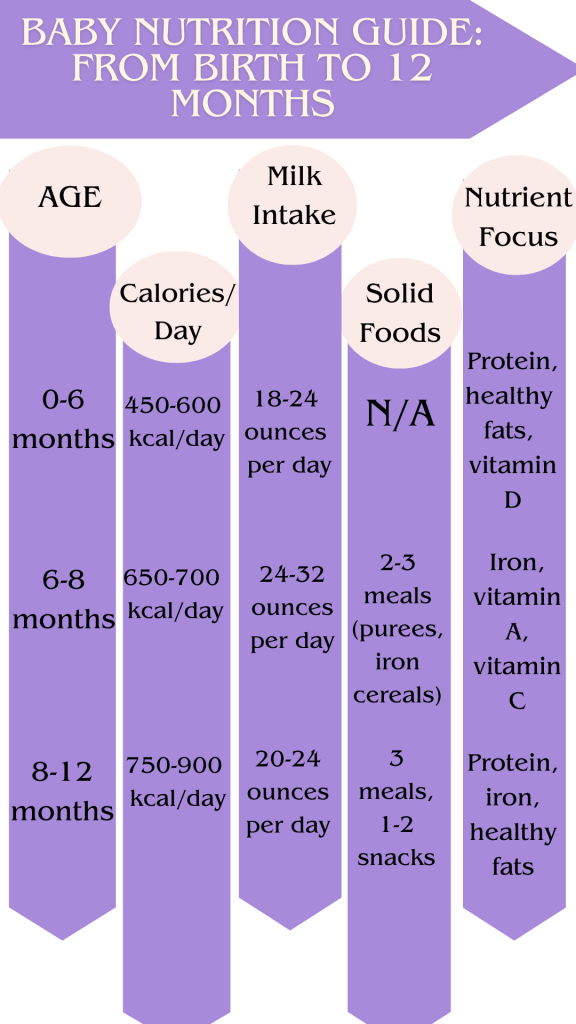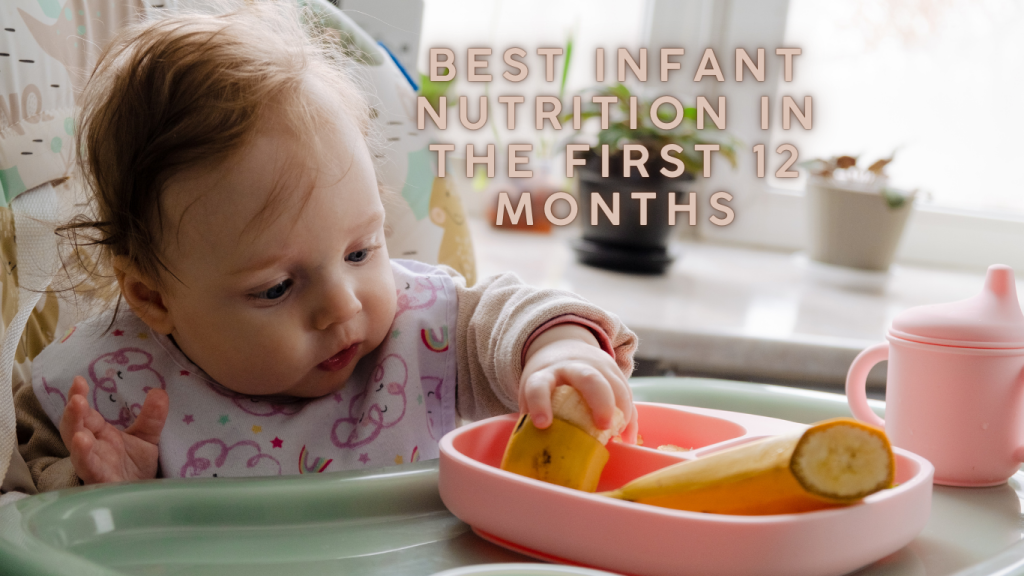Did you know that in the first 12 months, newborns typically triple their birth weight and grow about 10 inches (25 cm) in length! This rapid growth requires adequate infant nutrition, which supports their developing brain, muscles, and bones during this crucial time.
Your little one undergoes a whopping five major growth spurts which means they are making tremendous growth in several aspects. Baby Nutrition plays a vital role in shaping a healthy future for your child.
In this blog, we will explore all aspects of infant nutrition from birth to 12 months.
Why is Infant Nutrition Crucial in the First 12 Months?
- Brain development: Several research studies have proven that the brain triples in size during the first year, so infants need healthy fats, proteins, and other vital nutrients to support neural growth.
- Immunity and strength: Newborns are born with low immunity as they are safe in their mother’s womb from infections. Nutrition for infants 0-12 months must contain antibodies and nutrients that will help them build a strong immune system.
- Bone and muscle growth: As the size of a newborn increases promptly, so do their bones and the muscles associated with these bones. Calcium, vitamin D, and protein are essential for bone and muscle development.
Meeting these nutritional needs requires careful attention to what and how much your baby is eating during each phase. As your baby grows, their daily nutritional requirements also change. Here’s how to figure out your baby’s daily nutritional needs.
How to determine nutrition for infants 0-12 months
The answer is very simple. Let your baby decide!
There is no one size fits all when it comes to baby nutrition, especially for infants of 0-12 months of age. Feeding your baby when they are hungry and not overfeeding them are equally important.
Infant Nutrition for Newborns (0-6 months)
From birth to 6 months, breast milk provides all the nutrition your baby needs. While the newborn feeding schedule may feel erratic at first, it’s essential to feed on demand to ensure proper growth and development.
Whether your baby demands milk every hour or once in 3 hours, it’s fine. Just follow your baby’s hunger cues and you should be good. Make sure you keep an eye on your baby’s pee count. You should ideally get 6-8 wet diapers daily.
Breast Milk: The Perfect Nutrition for Infants
For babies, breast milk is the gold standard. It contains the perfect balance of nutrients for optimal growth and immune support. The World Health Organization (WHO) and American Academy of Pediatrics (AAP) recommend exclusive breastfeeding for the first six months.
Breast milk offers:
- Proteins: Easy-to-digest proteins that support muscle development.
- Fats: Critical for brain development.
- Vitamins and minerals: Natural sources of vitamins like A, D, and C, along with minerals such as calcium and phosphorus.
- Immunity: Antibodies that protect the baby from infections.
Newborn Feeding Schedule
- Newborns typically feed every 2-3 hours, consuming 1-3 ounces of breastmilk per feeding. However, feed on demand because all babies are different.
- As they grow, they may stretch to 3-4 hours between feedings. Also, with time, your baby starts sucking in more breastmilk and as a result more quantity is consumed per feeding.

The Transition Phase: 6 to 12 Months
By six months, your baby’s nutritional needs will start to change. While breast milk remains the primary source of nutrition, solid foods can now be introduced to supplement their diet. This period is essential for introducing various textures and flavours to support your little one’s sensory and motor development.
Starting Solids: Boosting Your Infant Nutrition Chart
Introducing solid foods can be an exciting but nerve-wracking milestone for parents. Start slowly, typically with single-grain cereals or pureed vegetables or steamed and mashed fruits. Be patient, as your baby may take time to adjust to new tastes and textures.
Keep offering the same food at intervals of 3-4 days if the baby rejects new foods/flavours/textures. They may require up to 15-20 times to get acquainted with new foods.
Top Foods to Introduce First
- Legumes: Offer boiled and thoroughly mashed legumes and dals to your baby. Ensure the consistency is neither too runny, nor too thick.
- Vegetables: Offer boiled or steamed veggies that are nicely handmashed. You may start with sweet potatoes, carrots, pumpkin and spinach.
- Fruit mash/puree: Apples, bananas, papayas, mangoes, chikoos are all time favorites. Make sure the fruit is ripe and mashed properly. If it’s hard, steam it before offering.
Infant Feeding Schedule at 6-9 Months
- 6 – 6.5 months: Start with 1 solid food (mash, puree or finger food) per day, preferably within 1 hour of waking up. Offer breastmilk on demand the rest of the time.
- 6.5 – 7 months: Gradually introduce the second solid meal (mash, puree or finger food). Your baby should now have 2 solid meals per day and breastmilk on demand the rest of the time.
- 7 – 7.5 months: Gradually increase the number of solid meals to 3 now. You may start offering textured foods like porridges and thick soups. Breastfeed on demand the rest of the time.
- 7.5 – 8 months: Time to make solid meals 4 times a day now. Offer breastmilk on demand the remaining times.
- 8 – 8.5 months: Offer 5 solid meals now including breakfast, lunch and dinner with 2 snacks. Offer breastmilk on demand after meals.
- 8.5 – 9 months: Keep offering a variety of meals to your baby and let them explore different flavours, textures and smells!
Daily Nutritional Requirements for Babies
Understanding the exact daily nutritional requirements for your infant helps you plan meals and feedings appropriately.
Daily Nutritional Requirements for Babies at 0-6 Months
- Calories: 450-600 kcal/day.
- Proteins: 9.1 grams/day.
- Carbohydrates: 60 grams/day.
- Fats: About 50% of daily caloric intake.
All of these nutrients are present adequately in breastmilk. There is no need for any additional meals at this age.
Daily Nutritional Requirements for Babies at 0-6 Months
- Calories: 650-900 kcal/day.
- Proteins: 11 grams/day.
- Carbohydrates: 95 grams/day.
- Fats: About 30% of daily caloric intake.
Breast Milk is the major source of nutrition until 12 months of age but it should be supported by other solid meals after 6 months of age.
How to Boost Your Infant’s Nutrition?
To ensure your baby is meeting their daily nutritional requirements, you can boost their intake by:
- Adding healthy fats: Add finely powdered peanuts, walnuts, flax seeds, pumpkin seeds to purees for a boost of healthy fats. You can also use ghee while preparing cooked foods for your baby for a dose of healthy fats.
- Adding iron-rich foods: Especially after six months, your baby needs more iron as their reserves start depleting. Add iron rich foods like chickpeas, spinach, poha, lentils, pumpkin seeds and beetroot to your baby’s diet.
- Including a variety of textures: As your baby grows, expose them to different textures like puree, cheela, soup and finger food. It helps them develop chewing and swallowing skills.
- Offering water: Once your baby starts solids, offer small amounts of water in a sippy cup to help with digestion.
Creating a Daily Nutritional Requirements Chart
A well planned daily nutritional requirements chart can help you track your baby’s food intake and adjust meals as needed. Here’s an example:
| Age | Calories/Day | Milk Intake | Solid Foods | Nutrient Focus |
| 0-6 months | 450-600 kcal/day | 18-24 ounces per day | N/A | Protein, healthy fats, vitamin D |
| 6-8 months | 650-700 kcal/day | 24-32 ounces per day | 2-3 meals (purees, iron cereals) | Iron, vitamin A, vitamin C |
| 8-12 months | 750-900 kcal/day | 20-24 ounces per day | 3 meals, 1-2 snacks | Protein, iron, healthy fats |
Figuring out infant nutrition is tricky. You never know what you are missing out on while planning your baby’s meals. What if you get all your baby’s meals planned in advance? That too using the ingredients that are already available in your kitchen? Happy Eaters App gives you a balanced infant feeding schedule which helps meet your baby’s daily nutritional requirements. With lots of baby-friendly recipes and amazing features, it’s a saviour for busy moms. Download the app now and see for yourself.




